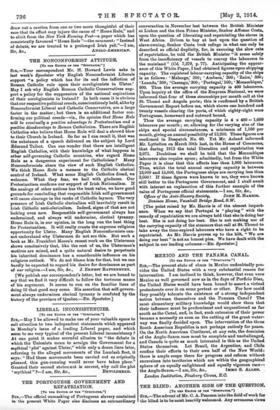THE NONCONFORMIST ATTITUDE. [To rus Eorros or rriz SI11, — Your correspondent
Mr. H. Howard Lewis asks in last week's Spectator why English Nonconformist Liberals support "a policy which has for its end the infliction of Roman Catholic rule upon their coreligionists in Ulster.' May I ask why English Roman Catholic Conservatives sup- port a policy for the suppression of the national aspirations of their coreligionists in Ireland? In both cases it is obvious that our respective political creeds, conscientiously held, alike by Nonconformist Liberal and Catholic Conservative, are a large factor in the matter ; but there is an additional factor con- firming our political creeds—viz., the opinion that Home Rule will be eventually a positive advantage to Protestantism and a positive disadvantage to Roman Catholicism. There are English Catholics who believe that Home Rule will deal a shrewd blow to their Church in Ireland. So far as I can recall it, that was the substance of a speech delivered on the subject by Lord Edmund Talbot. Can one wonder that there are intelligent English Catholics, with their knowledge of what happens in other self-governing Catholic countries, who regard Home Rule as a dangerous experiment for Catholicism P Many Nonconformists share the view of such English Catholics. We think Home Rule a menace to the Catholic clerical control of Ireland. What some English Catholics dread, we welcome. What they fear, we hail with gladness. Our Protestantism confirms our support of Irish Nationalism. If the analogy of other nations has the least value, we have good grounds for concluding that responsible Irish self-government will cause cleavage in the ranks of Catholic laymen. The very pressure of Irish Catholic clericalism will inevitably result in lrieh Catholic anti-clericalism. Indeed, signs of that are not lacking even now. Responsible self-government always has undermined, and always will undermine, clerical tyranny. Home Rule is, in our opinion, in the long ran the best thing for Protestantism. It will really create the supreme religious opportunity for Ulster. Many English Nonconformists can- not understand why Ulstermen do not see this. But such a book as Mr. Frankfort Moore's recent work on the Ulsterman shows conclusively that, like the rest of us, the Ulsterman's motives are mixed, and a quite natural desire to perpetuate hia inherited dominance has a considerable influence on his religions outlook. We do not blame him for that, but we can hardly be expected to regard his desire for dominance as part of Our religion.—I am, Sir, &c., J. ERNEST RATTENRURY.
[We publish our correspondent's letter, but we are bound to may that we find it very difficult to follow the tortuous mazes of his argument. It seems to run on the familiar lines of doing ill that good may come. His assertion that self-govern- ment always undermines clerical tyranny is confuted by the history of the province of Quebec.—En. Spectator.]














































 Previous page
Previous page